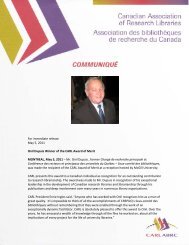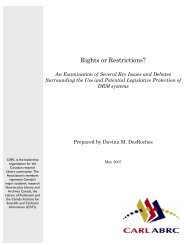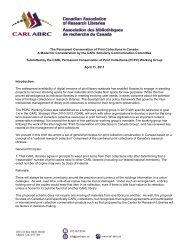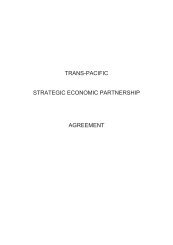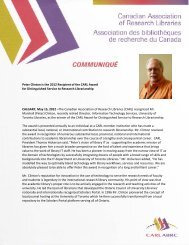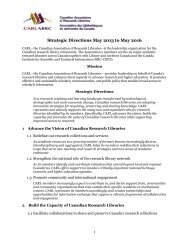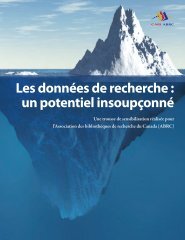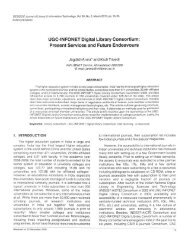PDF - CARL - ABRC
PDF - CARL - ABRC
PDF - CARL - ABRC
Create successful ePaper yourself
Turn your PDF publications into a flip-book with our unique Google optimized e-Paper software.
Document 14<br />
PROPOSED MANDATE – STAKEHOLDER MEETING<br />
March 24, 2010<br />
The ecology of research communication is a complex system that encompasses: scholarly journals,<br />
with researchers as “voluntary” authors, academic editors, and peer reviewers; professional publishers<br />
including editors, proof readers, and layout artists; sponsors and funders inclusive of scholars’<br />
groups, disciplinary associations, university presses, ducational/research institutions, and Canada’s<br />
research funding agencies; and libraries and researchers as consumers and archivists.<br />
Information and communication technology (ICT) has disrupted print-derived ecology and created<br />
new opportunities for the reconfiguration of the production of and access to scholarship. A certain<br />
momentum is building toward Open Access, which, if implemented would deprive existing<br />
subscription-based journals of the majority of their income. In the name of a good fight to curtail<br />
excess profit-taking by large, international, commercial journal publishers, insistence on Open Access<br />
could undermine a tremendously valuable legacy of established and prestigious, efficiently produced<br />
research publications that are the output of Canada’s research community through scholarly journal<br />
and monograph publishers.<br />
The central challenge and the reason for this meeting is the preservation of the value of research as it<br />
is communicated in the form of peer-reviewed journal and monograph publishing while taking<br />
maximum advantage of emerging opportunities based largely on ICT. CALJ/ACRS believes that this<br />
challenge can best be met by bringing together all stakeholders/participants, hence this meeting, with<br />
a view to each understanding the goals, needs, preferences, and positions of all others. With that<br />
understanding in place, it is our view that needed resources can be identified and allocated to<br />
maximize the efficacy of an emerging research communication system that will best serve the<br />
research community and society.



